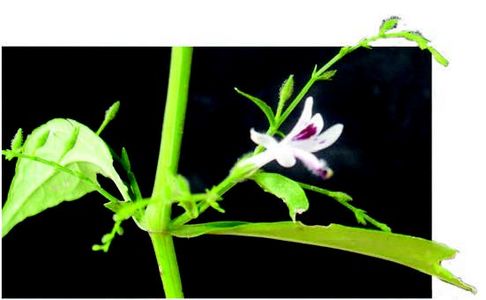Andrographis paniculata : Différence entre versions
De PlantUse Français
(→Description) |
|||
| Ligne 27 : | Ligne 27 : | ||
*inflorescence terminale en panicule avec des feuilles secondaires ; rachis glabre à légèrement pubescent, bractées triangulaires à subulées | *inflorescence terminale en panicule avec des feuilles secondaires ; rachis glabre à légèrement pubescent, bractées triangulaires à subulées | ||
*fleurs blanches de 1,5-2 cm avec des points pourpres | *fleurs blanches de 1,5-2 cm avec des points pourpres | ||
| − | *fruit | + | *fruit : capsule ellipsoïde, glabre ou pubescente à trichomes glanduleux sur la pointe |
| − | *graines rugeuses | + | *graines rugeuses de 2 x 1,5 mm |
== Noms populaires == | == Noms populaires == | ||
Version du 10 novembre 2020 à 10:36
Andrographis paniculata
(Burm. f.) Wall. ex Nees
| Ordre | Lamiales |
|---|---|
| Famille | Acanthaceae |
| Genre | Andrographis |
2n =
Origine : Asie tropicale
sauvage et cultivé
| Français | |
|---|---|
| Anglais |
Résumé des usages
- médicinal
Sommaire
Description
- plante herbacée jusqu’à 50 cm de haut, très ramifiée
- feuilles ovales-lancéolées à éliptiques, de 1,5-7 cm de long et de 1-2,5 cm de large, glabres, vert pâle sur l’envers, 3 à 5 nervures secondaires de chaque côté de la nervure centrale, marge entière, pointe aiguë à acuminée courte
- inflorescence terminale en panicule avec des feuilles secondaires ; rachis glabre à légèrement pubescent, bractées triangulaires à subulées
- fleurs blanches de 1,5-2 cm avec des points pourpres
- fruit : capsule ellipsoïde, glabre ou pubescente à trichomes glanduleux sur la pointe
- graines rugeuses de 2 x 1,5 mm
Noms populaires
| français | roi des amers (PROSEA) |
| anglais | creat, green chireta, king of bitters (PROSEA) |
| sanscrit | bhunimba, kirata (Wealth of India) ; भूनिम्ब - bhunimba, कालमेघ - kalamegha, महातिक्ता - mahatikta, यवतिक्ता - yavatikta (Flowers of India) |
| hindi | िकरायत - kirayat, करायत - kiryat (Mansfeld), kalmegh, mahatita (Wealth of India) ; हरा चिरायता - hara chirayata, कालमेघ - kalmegh, कल्पनाथ - kalpanath, किरयित् - kirayit, महातीता - mahatita (Flowers of India) |
| bengali | kalmegh (Wealth of India) ; কালমেঘ - kalmegh (Flowers of India) |
| marathi | olikiryata (Wealth of India) ; कालमेघ - kalamegha, कल्प - kalpa, ओले किरायत - ole kirayat, पाले किरायत - paale kirayat (Flowers of India) |
| gujerati | kariyatu (Wealth of India) ; કરિયાતું - kariyatu (Flowers of India) |
| telugu | neelaveemu (Wealth of India) ; నేలవేము - nelavemu (Flowers of India) |
| tamoul | nilavembu (Wealth of India) ; நிலவேம்பு - nilavempu (Flowers of India) |
| konkani | व्हडलें किरायतें - vhadlem kiraytem (Flowers of India) |
| kannada | nelaberu (Wealth of India) ; ನೆಲಬೇವು - nelabevu, ಊರಕಿರಿಯಾತು - urakiriyatu (Flowers of India) |
| malayalam | kiriyattu, melaveppu (Wealth of India) ; കിരിയാത്ത - kiriyatta, നിലവേപ്പ് - nilavepp (Flowers of India) |
| oriya | bhuinimba (Wealth of India) ; ଭଦ୍ରତିକ୍ତା - bhadratikta, ଭୁଇଁ ନିମ୍ବ - bhui nimba, ହୈମ - haima, ଶଙ୍ଖିନୀ - shankhini, ଶ୍ବେତ ବୁହ୍ନା - shweta buhna, ସ୍ଥୂଳପୁଷ୍ପୀ - sthulapushpi (Flowers of India) |
| Gondi | bhui limb (Wealth of India) |
| Mundari | bhuinim (Wealth of India) |
| Assam | kalameghi, mahatita (Mansfeld) ; কালমেঘ - kalmegh, মহা-তিতা - moha-tita, চিৰতা - sirota (Flowers of India) |
| népalais | अंकुरि फुल - ankuri phul, कालमेघ - kalamegha, कलपनाथ - kalapnath (Flowers of India) |
| dogri | काला चिर्यात - kala chiryata, किर्यात - kiryata (Flowers of India) |
| manipuri | ꯚꯨꯕꯇꯤ - bhubati (Flowers of India) |
| mizo | hnakhapui (Flowers of India) |
| punjabi | ਚਰੈਤਾ charaita (Flowers of India) |
| Philippines | aluy, lekha (tagalog), sinta (bikol) (PROSEA) |
| Indonésie | ki oray (sundanais), sambilata (javanais), ampadu (Padang) (PROSEA) |
| Thaïlande | fa thalaai (Bangkok), khee-pang-hee (chinois), yaa kannguu (Songkhla) (PROSEA) |
| Vietnam | công cộng, khổ diệp, xuyên tâm liên (PROSEA) |
Classification
Andrographis paniculata (Burm. f.) Wall. ex Nees (1832)
Cultivars
Histoire
Usages
In the Indian lowlands and Assam occasionally cultivated as a medicinal plant. Roots, leaves and young twigs are used as a remedy for jaundice. The drug is used as a bitter stomachic and tonic and as a substitute for quinine.
Mansfeld.
Références
- TRAMIL, Pharmacopée végétale caribéenne, éd. scient. L. Germosén-Robineau. 2014. 3e éd. Santo Domingo, Canopé de Guadeloupe. 420 p. Voir sur Pl@ntUse



